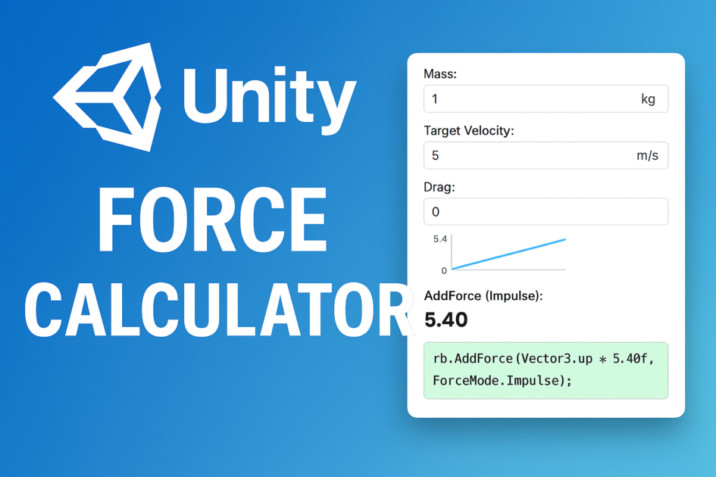📘 Mini Guide: How Unity Devs Can Use This Force Calculator Tool
Whether you’re building a first-person shooter, a fast-paced platformer, or a physics sandbox in Unity — calculating the exact AddForce value is often a time-consuming guessing game. This tool removes the guesswork.
Here’s how you use it:
Enter the Mass of your Rigidbody
Match this value to your Unity object’s Rigidbody mass (rb.mass).Input your Target Velocity or Jump Height
For general force: use the standard calculator.
For jump mechanics: switch to Jump Height Calculator Mode to simulate character jumps with gravity, drag, and more.
Set Gravity & Drag Values
Use Unity’s default-9.81gravity or tweak it for special game environments (like low-gravity planets).Copy the Auto-Generated AddForce Code
You’ll get an instant line like:csharprb.AddForce(Vector3.up * 15.42f, ForceMode.Impulse);
Test in Unity — No More Trial and Error
Just paste the code and test. You’ll notice accurate physics behavior without needing to tweak force values 20 times.
📈 Real Use Cases: What Game Types Benefit from This?
This calculator was built specifically for Unity game developers who want precision physics without wasting dev time.
✅ Use it for:
🕹️ 1. Platformer Games
Design pixel-perfect jumps — from double jumps to low hops to high gravity slams.
🚗 2. Vehicle Physics in Racing Games
Use the dashboard to calculate AddForce for velocity-based acceleration or braking based on vehicle mass.
🧍♂️ 3. Character Controllers in Action RPGs
Ensure your player’s jump or dash force feels just right, even on mobile.
🏀 4. Projectile or Ball Physics
Whether you’re simulating a basketball shot or a grenade throw — you’ll get the exact force needed for realistic arcs.
🚀 5. Zero Gravity or Space Simulators
You can set gravity to 0.0 and simulate force-based thrust in space environments (space ships, jetpacks, etc.).
💡 Why This Matters for Unity Developers
Manually testing Rigidbody physics in Unity can waste hours. You guess a force value, test in play mode, tweak it, and repeat. This tool saves that time — and gives you physics that feel right from the start.
It’s like having a physics engineer in your browser.
🧠 Frequently Asked Questions
What is the Unity Force Calculator?
The Unity Force Calculator is a free web-based tool designed to help Unity developers calculate the exact AddForce value needed for physics-based movement, such as character jumps, vehicle acceleration, or projectile motion. It eliminates guesswork by providing real-time, accurate physics values.
How does this calculator help in Unity game development?
It helps you calculate the precise force (F = m × a) needed for Rigidbody actions in Unity, avoiding repetitive trial-and-error. You can generate physics behavior that feels “just right” on the first try.
Can I use it for 2D or 3D games?
Yes! The physics formula works in both dimensions. Just make sure to adjust your force direction when applying it in Unity — use Vector2 for 2D and Vector3 for 3D.
What if I want a character to jump a specific height?
Use the “Jump Height Calculator Mode” to enter mass, target height, drag, and gravity. It calculates the force and even gives you Unity code you can directly copy into your scripts.
Does this tool support gravity customization?
Yes! Adjust the gravity to simulate various environments like Earth (-9.81), the Moon (-1.62), or zero-gravity situations (0.0).
Is the output compatible with ForceMode.Impulse in Unity?
Absolutely. The generated code is tailored for ForceMode.Impulse and is ready to plug into your Rigidbody.AddForce() calls.
Can I simulate different character types?
Yes. The tool includes presets like light characters, heavy characters, and double-jumps — or you can enter your own custom values.
Do I need to install anything?
No installation required. It runs fully in-browser. You just need JavaScript enabled.
Is it free to use?
Yes, 100% free to use. No signup. No restrictions.
Can I suggest a feature or preset?
Definitely! If you’d like to see wall jumps, gravity zones, or projectile presets — reach out via the contact form or site comments. Feedback is welcome.

